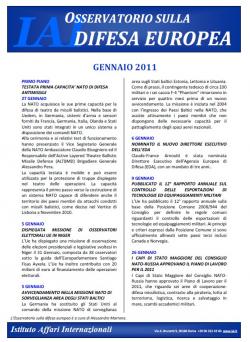Observatory on European defence, June 2006

1-2 June 2006
EU Justice and Home Affairs Council - Countering International Terrorism, European Evidence Warrant
On 1 and 2 June the Justice and Home Affairs (JHA) Council met; the report on the implementation of the EU Counter-Terrorism Strategy and related Action Plan was submitted by the EU Counter Terrorism Coordinator de Vries. The problems presented concern the complexity of the decision-making process at European level, and the delayed transposition in the member states’ orders, all factors that can undermine the efficacy of the adopted measures.
Among the most significant outcomes is the agreement on the European Evidence Warrant in criminal matters. Once it enters into force, probably in two years, the warrant will allow a request made by a judicial authority of a member state to be directly recognized and executed by another EU country. Telecommunication data, DNA samples and fingerprints are not kinds of evidence covered by the warrant; a review of the mechanism is foreseen every 5 years.
8 June 2006
NATO - Capabilities
The North Atlantic Council (NAC), meeting at defence ministers level, adopted a new ministerial directive - approved by the Defence Planning Committee - defining a reference framework for the development of the Atlantic Alliance and member states’ capabilities in the next 10 years.
The plan aims at an adaptation to current scenarios requiring the deployability of small groups, while maintaining the traditional large-scale capability and the possibility of conducting more operations simultaneously.
Moreover ministers confirmed the goal of continuing the transformation of their armed forces and the commitment to increasing national defence budgets to 2% of their GDP.
12 June 2006
EU General Affairs and External Relations Council - Iraq, Democratic Republic of Congo, Aceh (Indonesia)
The presence of the European Union in crisis management scenarios consolidates worldwide: East, Africa, Balkans and Asia.
Ministers adopted a Joint Action, in line with the request made by Iraqi authorities, extending the ongoing integrated Rule of Law mission (EUJUST LEX) in Iraq, operational since 1 July 2005, for another 4 months (until 31 October 2006) as the first phase of the 18-month extension supported by the EU Political and Security Committee (COPS).
Ministers formally adopted the decision launching the “EUFOR RD Congo” mission, sustained by the Council last April in support of the UN MONUC mission. The autonomous military operation of the EU, aimed at ensuring the security of the entire electoral process scheduled to start at the end of July, will last until 30 November and will involve about 2,000 soldiers based in proximity of Kinshasa and outside the Congolese territory ready for a rapid intervention.
An extension was also foreseen for the mission responsible for monitoring the peace agreements between the government and the separatist guerrillas in the Indonesian province of Aceh, which the EU has been carrying out since last September in cooperation with some states of the region. In fact a Council Decision of 7 June extended the Aceh Monitoring Mission (AMM) until 15 September 2006.
15-16 June 2006
European Council - Six-monthly ESDP Report, EU Presidency mandate
The European Council adopted the six-monthly ESDP report submitted by the EU Presidency.
The report provides a positive assessment of the EU missions in the world and reports on the process of developing civil and military capabilities and their coordination.
In the capabilities framework, the role of the European Defence Agency (EDA) was also considered. It is now reaching full operability in R&T, but also in some solutions concerning capabilities, in particular strategic airlift, and defence market regulations, referring to the Code of Conduct on defence procurement entering into force next month.
Moreover the report considers strengthening the European disaster response, backed by military assets made available by member states and the positive EU/NATO cooperation in building a strategic partnership for crisis management.
The coming EU Presidency, assumed by Finland, has been mandated with Further development of these critical assets.
21 June 2006
EU/USA Summit - strategic partnership and Countering the International Terrorism
In 21 June the bilateral EU/USA summit was held in Vienna.
The discussion touched on several issues concerning the security and foreign policy agenda, among which strengthening the transatlantic strategic partnership, cooperation in energy matters and the fight against international terrorism.
In this field, in spite of common objectives, differences of method remain that are revealed by some open questions: on 12 June the European Parliament adopted a resolution requiring the United States to close the Guantanamo detention center and to treat prisoners in compliance with international humanitarian law, a line supported by the EU Presidency and the Commission.
This adds to the inquiries of the Council of Europe and the European Parliament on the alleged use of the EU territory by the CIA or third countries for the transfer and illegal detention of prisoners.
June 2006
Non Proliferation, Iran
On 1 June, the EU-3 (France, Germany, United Kingdom and High Representative for CFSP Solana) finalized, together with United States, Russia and China, a package of economic and political incentives and sanctions aimed at freezing Tehran's uranium enrichment activities. The offer, which allows the use of the nuclear energy only for pacific purposes, was worked out by the EU-3, and submitted by Solana to the Iranian authorities on 6 June.
-
Details
Roma, Istituto affari internazionali, 2006 -
Issue
06/06


